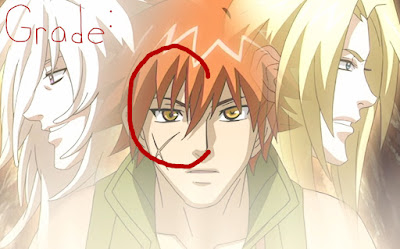How would you feel if you could remember a past life? Would that past life have some kind of impact on your current life? Perhaps in a past life, I could have been more of a mecha fan than I am in this life. Even though I don’t consider myself to be a huge fan of mecha anime, I still happened to have a particular one on my to-watch list for years for rather stupid reasons; after finding a DVD of it at my local library, though, I finally got around to watching it. Now that I’m finished with it, though, exactly what do I think of it?
Merge one! Merge two! Go, my review of Aquarion! (Okay, that was terrible.)
Aquarion takes place 12,000 years after a war between the Earth and a race known as the Shadow Angels. The Shadow Angels went into slumber after the end of the war, but eleven years before the beginning of the series, a disaster brought the Shadow Angels back to Earth, with them resuming their feeding of humans’ life force. To combat this, an organization called DEAVA uses a mecha called Aquarion, which had been used 12,000 years prior and requires people with special powers called Elements to pilot three fighter planes called Vectors to combine them into Aquarion by “merging”. (A lot to take in, I know.) The series mainly follows Apollo, a boy who is believed to be the reincarnation of Apollonius, who played a large role in the war. He is recruited by DEAVA to become a pilot for Aquarion, and when his friends are taken by the Shadow Angels, he agrees.
It is difficult to explain what kind of story Aquarion is trying to tell, but exactly what kind of story it actually tells is even worse. A good portion of the anime’s 26 episodes contain filler that contribute absolutely nothing to the plot; filler episodes aren’t necessarily a bad thing if those filler episodes were entertaining to watch, but with Aquarion’s filler episodes, I would just groan out of frustration from how stupid they are. Fortunately, the series DOES try to tell a cohesive story, and I commend the attempts at telling that story. However, most of the plot twists are too predictable or just plain confusing; there were very few that I actually liked. Another thing that I must mention is the fact that it doesn’t try that hard to differentiate itself from other mecha anime; I have at least seen enough mecha anime to be watching this and thinking, “Yeah, that’s happened before.”
As for the characters, they’re honestly a bit of a mixed bag. All of the characters are cliché, but some of them are actually likable in spite of that. However, there is one issue that the characters share, and that is the amount of development. Most of the characters get one or two episodes of real development each, if any at all; after that, although those characters may get some time in the spotlight, any real development instead goes to Apollo, Silvia, and maybe Sirius. I must admit that it was kind of interesting to see the development of Apollo and Silvia’s relationship, but the other relationships in this series don’t get as much attention or development, which is a real shame.
The art and animation.... What can I really say about those? Well, the settings were decent, and some of the character designs were good. The CG animation wasn’t that good, but it may just be that this anime came out in 2005, when CG animation wasn’t the best. I really, REALLY want to praise the more 2D animation; Satelight and Production Reed have each done some decent animation, and in this series, some of the animation is actually good. The key word there is “some”; it may, again, just be the fact that this anime came out in 2005, but the animation quality is a bit inconsistent and falls at times. The biggest offender of this is episode 19; a majority of that episode was drawn in a different style altogether, and while I understand why the animators decided to go that route with that episode (although it did come off as rather jarring), the parts of the episode that returned to the normal style of this series were very poorly animated and came off as even more jarring.
One genuine praise I have for Aquarion, however, is the music. Both of the opening themes sound like they could be the opening themes for most other mecha anime, but they’re catchy enough to warrant a re-listen or two; the same goes for the ending theme, although that is more because of how completely beautiful it sounds, from the instrumentals to Yui Makino’s voice. The soundtrack is pretty good, too; the piano rendition of the first opening theme is absolutely, breathtakingly gorgeous. Finally, I watched the English dub of Aquarion, and the voice acting is pretty good for its time. The characters’ voices fit their characters quite well (although Brian Palencia as Silvia takes a bit of getting used to, although that may just be my fault for not knowing she voiced her and dumbly expecting a different voice to come out of her mouth), and they convey their emotions quite well.
Overall, Aquarion is pretty much just your average mecha anime. No one is going to kill you if you don’t watch it, but hardcore mecha fans may get a kick out of it. There is more to the Aquarion anime than just these 26 episodes, however; I wonder how it evolves from here....



Comments
Post a Comment